Treating obesity is like treating any other chronic and multi factorial health condition. Hardly ever is there one universally effective method available for achieving equal results in all patients. Combining and re-doing different surgical procedures gives us a chance to overcome those limitations. Disappointing or non-durable results of primary weight loss surgery do not automatically mean permanent failure of treatment.
Patient related
All patients vary in their biological response to surgery and in certain cases a well performed and technically correct primary procedure does not give expected results regardless of patients adherence to dietary and lifestyle guidelines after surgery. Also, the side effects of otherwise effective procedure may prove to be intolerable like severe hypoglycemic episodes after gastric bypass or heartburn after sleeve gastrectomy. A revision surgery can strongly be considered here with excellent results.
On the other hand, inability and unwillingness to change ones lifestyle after surgery, or substance abuse occasionally may lay behind failure and it is unlikely that secondary surgery would improve the outcome without adopting new habits.
Some medicines may increase appetite by affect eating behavior and metabolism leading to weight regain after good initial weight reduction. Revising medicine lists and searching for alternatives should be considered here.
Surgeon related
Technical errors made in primary surgery may reveal themselves 1-2 years later when initial excellent weight loss is halted and replaced with weight gain. For instance, oversized gastric pouch in gastric bypass or gastric sleeve too large in diameter may enable good initial weight loss followed by loss of restriction and appetite control later, leading to weight regain. If the patient is well motivated and follows the lifestyle guidelines their revision surgery may have excellent results here. A prerequisite for efficient revision is understanding of “normal” weight loss facilitating post-surgical anatomy and recognition of the technical shortcomings in every particular case.
Procedure related
It is obvious, that not all weight loss procedures can stand the test of time and some of them inherently require further actions. In up to 10 years perspective gastric band can function predictably and satisfactorily but being a foreign body it eventually breaks down or migrates losing its effect. Longstanding weight loss after sleeve gastrectomy may fade as gastric tube stretches out resulting in loss of restriction and portion control.

